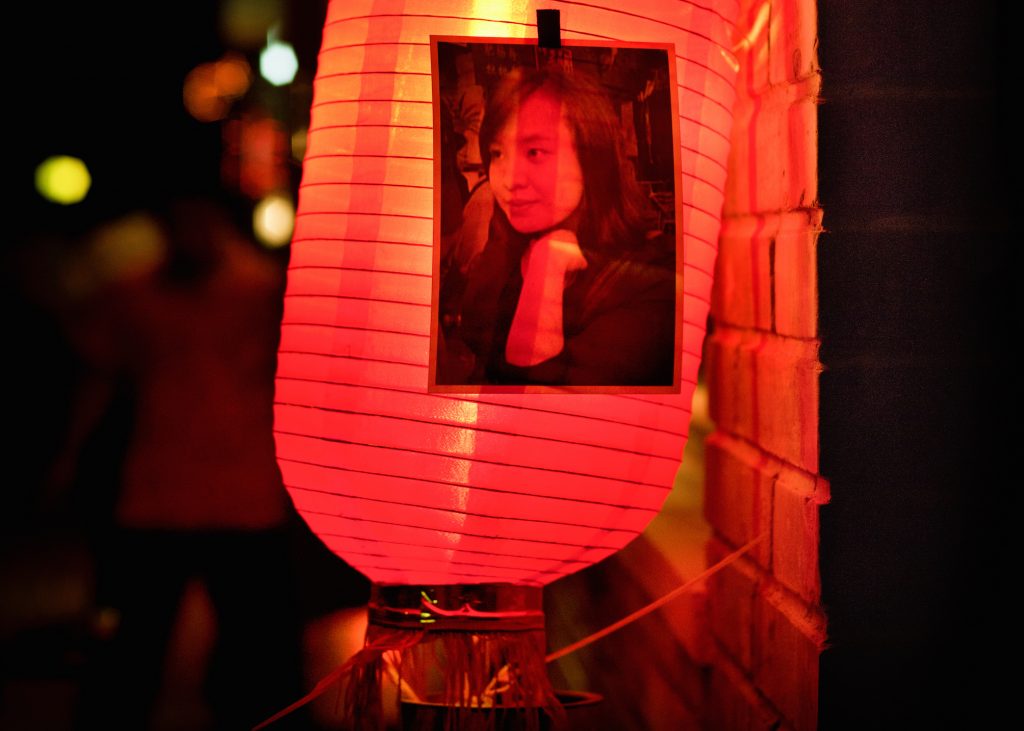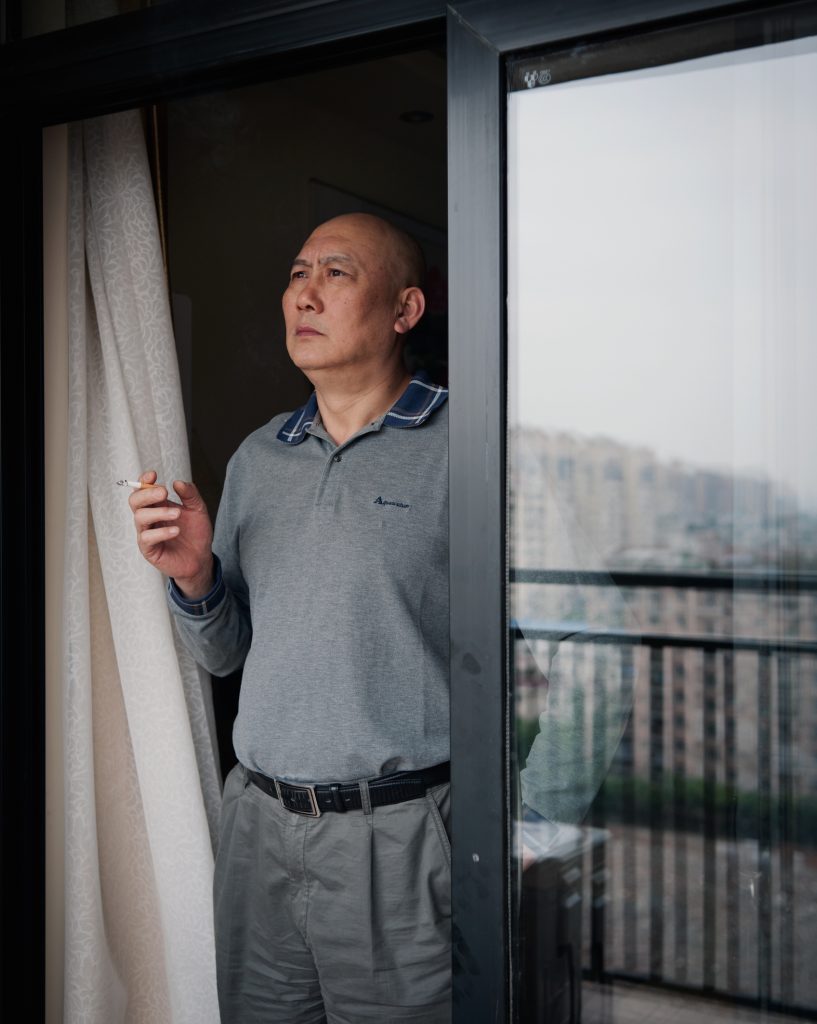In turbo-capitalist China paid mistresses are back. Their game for money and feelings is risky
PREVIOUSLY, SHE SAID , she had been someone else. Quiet and lonely. Never in her life had there been enough money, enough love. Until she stepped onto a stage at 18 and sang. Men brought flowers and she realised: it’s all very simple.
A Saturday evening, the air is soft as silk. Wen Jing, 24, wears a skirt so short it reveals her garters. She has painted her lips red, a tag „I am a lovaholic“ dangles from her handbag. Wen wants to go to Baba, she always wants to go to Baba because it is „the highest club“ in her hometown Chengdu. Just before the door, she pulls the comb out of her handbag, strokes her hair with it and says: „Do you bet everyone just wants me? Ten men a night, minimum.“
And who knows, maybe one will want to marry her, one who has money and success, maybe he’s had enough of his wife and wants: her instead. Once Wen was a concubine, a mistress of married men, she would be again. „But only if there is a prospect of marriage.“ Marriage is ultimately the goal of every concubine.
She sails through the door, she is now someone else, she is radiant. There are women dancing in the club, more beautiful than Wen, but none understands seduction like she does. There is nothing strained in her behaviour, she unfolds her artistry with the somnambulistic certainty of a dancer. The DJ plays I wanna be a billionaire and she dances.
Her gaze goes to the side, to a man at the bar, she opens her eyes, just a brief moment, there is so much in them – I will make you fly, do you dare? She smiles, the tip of her tongue flashing out barely visible. He stares at her, she turns away, makes him squirm. It doesn’t take five minutes and she’s flirting with four men at once, like an accomplished table tennis player manages four serves in short intervals, controlling the direction, spin and tempo of each ball. One of the men, tall, glasses, late 30s, unassuming, is exactly her type. He doesn’t put on a big show, and yet he looks like he could have money.

Many rich and powerful people are enjoying themselves at the Baba, there are chaperones everywhere, making sure no one takes a photo. The rich and powerful are Wen Jing’s target group. Here in Chengdu, the capital of Sichuan province in southwest China, you meet them everywhere. Nowhere in the country does Louis Vuitton sell more than here. Three years ago, a huge earthquake shook the province, and since then no one carries their money to the bank. They want to live in the here and now. At Baba, breathtakingly beautiful women snuggle up to older men, the young men pay no attention. „They are not successful,“ Wen says, „and those who are not successful are not attractive.“
Her husbands were successful. The first was a businessman from Beijing, he made in real estate. She was 18, he was 37. „I’m just looking for a mistress,“ he said. „It was the most innocent love of my life,“ she says. He rented a flat, gave her up to 30 000 renminbi a month in pocket money, the equivalent of more than 3000 euros. Number two was divorced, he had a clothes shop and gave her expensive wardrobe. Number three, married, also in the real estate business, gave her the down payment for a flat. Wen Jing does not need the men to survive. She earns more than 2000 euros a month, a good salary. First she worked as a singer in bars, today she sells Chinese remedies.
But she thinks a man should „improve her life“. Wen also looks for the father in men. Hers ran away because there was someone else. He let himself be disowned when Wen was in hospital as a teenager, he didn’t want to pay the bill. „I lacked love as a child, now I’m looking for it.“ For someone who would treat her as if she were the most precious thing in the world. „Who will spoil me as if I were a child.“ She looks on the internet, in bars, in the nightlife, she asks everyone if he could introduce her to „someone successful“. She gets to know many men, „but if I don’t like one little thing, I immediately look for the next one“.
If there is one thing that is constant in Wen’s life, it is change. Her face can change in seconds. One evening she sings in a friend’s living room, her expression becomes so sensual – barely finished, she triumphs. „Great voice, isn’t it? Everyone says so. My skin is so beautiful, white like a European’s. And my sense of humour is particularly distinctive.“ There are moments between affection and hatred. She will yell at us, reporter and photographer, in the evening in front of the club: „Leave me alone“, only to call us in the morning after a night out: she really wants to see us. In the evening she laughs and dances, in the morning she says, „Why is life nothing but suffering?“
It may be that Wen Jing fits perfectly into this time of upheaval. She didn’t have the best cards in life. „If I had had a better childhood, I would have a PhD now.“ But she doesn’t dwell on that for long. She makes the best of what is. Everything could be an opportunity. Maybe even the detective she met ten days ago through a marriage website.

PRIVATE DETECTIVE Wei Wujun is almost there. The concubine he is shadowing lives in the block of flats there, and her car is parked in the underground car park. He tries to get to it, but a security guard blocks the gate. „Who are you? I don’t know you.“ Wei knows what he has to do. He’s been doing the job for 18 years, they call him the „concubine killer“. „Everyone knows me, I’m the estate agent, let’s go in together, I want to look at the property.“ The guard gives in, Wei lulls him with a barrage of trivialities until he drops, as if in passing, „I’m going to the underground garage, let’s see what the phone network is like there. Go ahead.“ Seconds later, he has the GPS device mounted under the concubine’s limousine. „Only the CIA has smaller GPS,“ Wei whispers, „now let’s get out of here.“
Wei was a soldier, hoping for a car- rer. His father was a senior military man until he fell from grace, the son ended up in jail „for political reasons“. It was, says Wei, „the best school of life“. He learned there how to lead, „to use the weaknesses of the enemy“. That helps him to this day. Wei was a workaholic, but now he is 57, he says he often feels tired.
His opponents are mostly mistresses. He hunts them on behalf of cuckolded wives. That is also the case now. His backer and her filthy-rich husband are Chinese Canadians. They live in Beijing, but he is often away. Business, he says. Adventures, she knows. He has eleven mistresses, but none is as much of a thorn in her side as the concubine in Chengdu, for she has borne him two children. He has bought her an expensive flat and given her many gifts. Wei says he has experienced many things, love and deceit in countless variations, „but this is the first time I have heard a story like this“. The mistress in Chengdu is said to have been goaded by her mother, who knew how to use her daughter’s body as capital. She was looking for a job for her daughter and urged her to apply and seduce the boss. Now mother and daughter live together in the luxury flat.
CONCUBINES, Wei says, were actually a thing of the past, a phenomenon of feudal China. Successful men kept concubines and concubines; emperors had thousands. Concubines helped to fulfil a man’s most important task: to produce as many male offspring as possible. And because marriages were arranged by parents without regard to the bride and groom, concubines were supposed to give the man what he was missing in his marriage. Concubines were considered the personal property of the master of the house, they could be bought and given away, in several poems of the Tang dynasty we find the phrase „exchange a concubine for a good horse“.

If a concubine lost the emperor’s favour, he banished her to the „Cold Palace“, sometimes concubines who had not borne the emperor a son had to follow him to his death. But while a man could entertain many wives at the same time, a woman was not allowed to bind herself to several men. Gu Hongming, a famous scholar of the Qing Dynasty who lived from 1857 to 1928, wrote: „We know that a teapot is accompanied by four cups. But has anyone ever seen one cup and four teapots?“ And further, „It is the selflessness of Chinese women that makes concubinage in China not only possible but not immoral.“
Rarely did a concubine or concubine make it to power. The most famous was Cixi, concubine of the emperor, who bore him the only male offspring and de facto ruled the country for decades at the turn of the last century but one. The communists sought to eradicate concubinage; for them it was a degenerate relic of the feudal era. Which did not stop Mao Zedong from indulging in hundreds of playmates. But most Chinese were far too poor to maintain a second wife.
Even in 1993, when Wei opened his detective agency, there were almost no concubines. But then businessmen from Taiwan and Hong Kong came to the mainland and their wives stayed at home. These men felt lonely and took second or third and fourth wives. In the meantime, these women are called ernai, second milk. Or xiao san, little third. (Today, there is also a club in Beijing where rich older women can find young lovers). Many people know „little thirds“, and yet it is incredibly difficult to meet one of these women. The subject is a big taboo.
Asian women are different from Western women, says the detective. Many women in the East like to lean on a man’s shoulder, „they are intelligent, they use each other’s strength“. China does not have a good social system, everyone is nervous, maybe you have money today, but what will it look like tomorrow? „Only a few are rich, and the poor want something from the pot of the rich.“
A man who wants to marry, an unwritten law says, needs a car and his own flat. But that is difficult in big cities where property prices are skyrocketing. Due to the one-child policy since 1979, many parents have aborted female foetuses. So there are more men than women in China’s under-32 generation. And yet, in the large selection of possible marriage partners, there are only a few who fulfil the aspiration of many women: to be successful.
Few in China were born rich. Those who have money usually got it themselves – and are already married, because another unwritten law says that you should marry before your 30th birthday. „A woman looking for a successful man doesn’t have that many options,“ Wei explains. „She can marry one in his twenties, but that is like betting on a horse. So she takes a divorced man or becomes a mistress.“
The detective himself, married, also hangs around marriage websites more often, „some of the girls are looking for fatherly love, others become mistresses.“ That’s how he meets Wen Jing. At first they get along well, but then there are problems. „I don’t want anything more to do with you,“ Wen writes, days later she thinks it would be nice if they met again.
WEN JING HAS hardly slept that night. Just like the nights before, there were men and parties, she wanted to forget. Sometimes she took three sleeping pills in the morning to get some rest. Now she stands tired and exhilarated outside courtroom number five of the Jinjiang District Court, Chengdu. Inside the courtroom, visible through a window in the door, stands the man who cheated on her, his head down, his hands cuffed. When he turns to the side, you see the strong body, a tanned peasant face, big round eyes. How he looked at her with those eyes. The very first month he sank to his knees, „Will you marry me?“ In the second month he asked her for the equivalent of about 14,000 euros – he wanted to open a business. Wen gave him the money. Later she learned that he had played the same game with eight other women. Wen, who played with men, had fallen for a swindler.
The wife of the accused comes out of the courtroom, a peasant woman, poor clothes, despair on her face. She sinks to her knees in front of Wen Jing, she takes her hand, she cries: „You’ll get the money back, even if it takes time. I beg you, ask the judge for a lenient sentence.“ Wen Jing pulls the comb out of her handbag, runs it through her hair and says, „He will get ten years. At least.“
ONE SUNDAY in Beijing, in the middle of a posh new development. Elegant women flock to the School for Virtuous Women to learn how to seduce a rich man. They learn how to gallantly pour tea and apply make-up to their faces. How to recognise a person’s true character from their face. How to win over a mother-in-law. You practise the art of arguing: agree with the man, then weave your own ideas into his. Traditional family values are taught, adapted to modern needs: The woman should work if she wants to, but not neglect her domestic duties.
The boss, Shao Tong, welcomes us. One side of her face, she has just explained in a course, shows her professional face, while the other reveals her true side, the mischievous child. She used to be a matchmaker for a matchmaking website, where she advised successful men. She says she knows what men are looking for, which is what she now teaches her students. „We don’t teach them how to love, we teach them how to make successful men fall in love with them. You have to know what he wants, otherwise you can’t spend his money either.“
There are successful men everywhere in China, says Shao, only: how do you get them? „Marriage is a second birth. When you get married, you can change your life.“ The
born in the seventies, she says, are more romantic than those born in the eighties, they have very different needs. „And let’s be honest: how many women can realise those? Only a few earn as much money as the men.“ Having to prove yourself all the time makes you tired. „Even if they talk about equality in China: Men are more powerful. A family is better for your future.“
AT THE VERY BEGINNING of our meeting, Xie Lijun, 37, throws her past onto the table. A thick stack of papers. „Read through this and there shouldn’t be any questions. I don’t want to talk about it anymore.“ Wherever she goes, her past is already there. There was a time when she was the third most searched term on a Chinese internet search engine, just behind Mao Tse-tung. When she tells it, you don’t know whether it’s just horror or a little pride.
Xie Lijun wants to get away from it, into the present. She leaves the hotel with an energetic, springy stride and heads for her red Buick, looking like the perfect cast for a TV series lawyer. Attractive, quick, belligerent. Xie wants to introduce us to the disenfranchised in her hometown of Cixi, Zhejiang Province, for whom she works as a pro bono citizen’s lawyer: Farmers who have been deprived of their land, a retired primary school teacher waiting for compensation for an accident. Two white cars
follow Xie on her way. She grins. „Oh, the party secretary’s people.“
She hits hooks and laughs in amusement as she manages to lose the pursuers. The party secretary, getting nervous, keeps calling her on her mobile, she wim- plies him. As time goes by, she becomes more and more relaxed, she giggles like a schoolgirl.
In the evening, however, the past catches up with her, her voice is now thin. She sits in a café, a tired, wounded fighter, and you understand: Her strength is the other side of her despair. „Something like this,“ she says, „is a scar for life.“ There are days when she walks through the city and people greet her, but who knows, maybe they do think: whore, bitch, degenerate thing. Others say it, write it in the chat rooms she visits. „He was,“ she says, „the love of my life.“ And being with him was her biggest mistake.
She met him seven years ago when she was driving a black taxi. He stopped her, a policeman, a permanent black taxi driver, a party member, a big shot by Cixi’s standards: he holds the rank of vice mayor. He confiscated her car and asked for her number. The next day he called, „I’ll come by“, he will want to investigate, she thought. Instead, he pulled her clothes off. Half he took her by force, half she let him take her. The next morning her car was parked outside.
She became his concubine, for a whole year, the couple travelled and enjoyed themselves.
He didn’t give her any money, but he paid for the pleasure they shared, about 4000 euros in total. She fell in love. And didn’t it look like he loved her too? Hadn’t he given her the favourite coin from his collection? Hadn’t he taken her, Xie, to his mother’s house on Chinese New Year, the big family day, instead of his wife? And then, how delighted they both were, she became pregnant.
But when she lost the baby after three months, he changed. He insulted her. And she wouldn’t put up with it. „You can’t just climb into bed with a woman like that,“ she said. „Whoever climbs into my bed pays a price.“ She wrote letters of complaint to newspapers, the party, a government office. She also included a sex video he had made with her. She posted her story online: „A weak woman’s cry for help“. Journalists came to interview her. Her case promised to be a scandal in itself: sex and politics, corruption and a functionary. But never, Xie says, did she publish the sex video on 40 websites, as some claimed.
The policeman begged her to stop, promising to return to her. But it was too late. Xie was someone else. No longer the lover, but the avenger. When she once again went to his workplace to complain, he beat her up together with his wife. What was worse was that he now hit back publicly. A friend of his posted on a forum that she was a bitch, a cheat.
a cheater who seduces married men for money. 607 people saw this, says Xie. Enough for the word to spread. From neighbour to neighbour, from house to house. Xie no longer dared to go outside. She no longer spoke to anyone, sat in front of the computer, read the hate mail and despaired. She went to his office, 70 sleeping pills in her blood, she wanted to kill herself in front of everyone.
She survived. And revenge became her purpose in life. How could she bear that he had used and humiliated her, that all the while he still sat at his post, respected and powerful, while the shame was all hers? His life had not changed, hers had been destroyed. She has gone to Beijing dozens of times to file petitions against him with a government agency. She hopes for a political campaign, for him to be fired. Because petitioners are considered troublemakers, she can no longer find a job. She lives off her parents‘ money and studies to become a lawyer.
„I know how hard it is to get justice. Men can play with women outside of marriage, but for women it’s a scar for life.“ Yet it is quite simple, says Xie: behind every man’s success are many women. Some are wives and others are mistresses. And behind every woman’s success are many men. „Women use men to get ahead. Only I didn’t do that, I’m quite stupid.“ Love, she says, has given her up. Her life is a struggle, for herself and others. She wants to go to Jiaxing now. A concubine in distress is waiting there.

THE THIRD CONCUBINE we meet is 31. She said she wanted to come veiled so no one would recognise her, wrapped in a black cloth. But then she stands in the hotel lobby in a pink dress, a fairytale figure of stunning femininity. In the anonymity of a hotel room, she wants to speak. She sits down on the chair, one leg bent towards the floor, as if awaiting her knighthood. Her language is interwoven with literary allusions. This is not an interview. It is a performance.
„Some may call me a concubine or mistress,“ she begins, „but I see myself differently. That term is a hat under which there are many different women.“
She was 20 and came from the countryside, she had little education and no experience in love. She worked in a hairdresser’s studio by day and in a karaoke parlour by night. She was one of those girls who entertained men.
She laughed when the men made jokes, she pretended to smoke and drink with them. She did not inhale, the alcohol she poured away secretly. „Never did I sell myself, neither my body nor my soul.“ One evening he came, 16 years older than her. He didn’t look much. „He drove a Santana, and I believed he was a driver.“ She didn’t like him much at first, but „he played up his seduction skills and I couldn’t resist.“
Night after night he visited her, concealing that he had a wife and child. After a year, he invited her to his home without comment, wanting her to understand that he was married. The second year he took her out to dinner with his wife and child. „She is my assistant,“ he told them. „Don’t worry,“ he said to her, „You are still too young for marriage. Wait until you are thirty and then I will marry you.“
She wore her hair short like a boy then. „Let it grow,“ he said, „it will look beautiful in the wedding photo.“ She has never had it cut since that day. She cherishes it, a black, flowing stream of promise.
The years passed. She studied literature and earned money – „I always had a knack for that“. He started a successful import-export business with her help. She never looked at anyone else in all those years. „When a woman loves a man, she lives like under a cheese cover.“
There were signs, fine cracks in her happiness, she refused to acknowledge them. She knows the date exactly, it was 18 October 2006. From that night on, he didn’t want to have sex anymore. „It didn’t bother me.“ He would lie with her when it was cold and dark, sometimes his wife would call. „I can’t,“ he would say into the phone, „I’m busy.“
She turned 27, 28, 29, and still no ring, no plans. „The sun rises and sets, the leaves turn green then brown. I was an innocent girl, now I am a flower that will wither.“ He had less time for her now. „I’m busy,“ he said the sentence to her now. She spat out the words as if they were poison. She was getting more and more nervous. One evening, they were sitting in the car, she asked him to stay. An hour or two. He said, „Get lost.“ That’s when she took the scissors from her handbag, the ones she uses to take care of her hair, and jammed them deep into her thigh. It showed the scars, two long crossed strokes, thin as cobwebs. He threw her out of the car. She wanted to die, „but it’s so hard“.
From that evening on, he withdrew. He threatened her: „If you go on like this, you will disappear. I won’t get my hands dirty.
I won’t get my hands dirty, but…“ In every possible way, he had tried to break up with her. And with every unanswered call, every night spent alone, her distress grew. „I am like a shadow following a body. And just as the shadow cannot leave its body, I cannot leave it either.“
And then he said the sentence that broke something inside her, „We have nothing to do with each other.“ Only because she didn’t have that paper, the marriage certificate. She got herself a jackknife, put it in her handbag, next to the tear gas. It was 13 December 2009, they were driving together in the car one more time. She reached into the bag and sprayed gas into his eyes. He got out, ran away, she after him, rammed the knife into his back. „I didn’t want to kill him. But I am a lover! I was twenty-nine! And he had promised!“
She returned to the car, shaking, thinking she was being sentenced to death. She dialled two numbers. The police’s and Xie Lijun’s, whom she had read about on the internet. She admired her „for fighting for women’s rights“. That same evening, the police released the concubine, it was only a small wound.
„We women are victims. His wife, me, all of us. All women are weak, but the concubines are the weakest. They all look down on us. They want to trample us, they think we are to blame for everything.“ The man she loves is horrible, she says, and they almost don’t see each other anymore. Yet she still loves him. „He is a cell in my body, every cell in my hair.“
Xie Lijun advised the concubine to separate from the man. Perhaps she could speculate that he would give her money. The concubine shook her head resolutely. No, she would go out of this world. Climb to the top of Mount Everest and never return. Or she would get into a boat, loaded with food and petrol, and go out to sea. When the food was gone, she would take the rest of the petrol and set the boat on fire. Xie nodded and said nothing, hoping that pragmatism would prevail in the end.
Xie drives home, across Hangzhou’s massive sea bridge, the second largest in the world. She stops in the middle, where the land is just a hint. She gets out and leans over the railing. Her hair flutters in the wind, the sea roars below her, yellow with mud. It smells of salt and distance.
„And if I were to start over somewhere else? Where no one knows me?“ Why wouldn’t she? She turns around, walks back to the car and laughs into the wind. „Oh no.“

